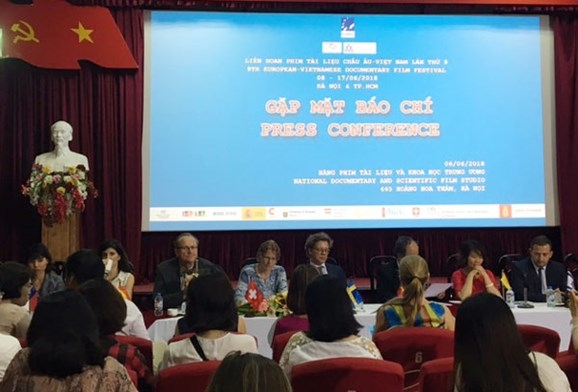
The ninth European - Vietnamese Documentary Film Festival will take place in Hanoi and Ho Chi Minh City from June 8 to June 17, screening 22 documentaries.

At
the press conference held on June 6 to introduce the film festival
The event is
held by Vietnam National Documentary and Scientific Film Studio and European
Union National Institutes for Culture (EUNIC).
Films from 11 European countries and regions will be
shown, namely Austria, the Czech Republic, Denmark,
France, Israel, Spain,
Switzerland, the UK and
Wallonie-Bruxelles, along with Vietnamese works.
Audiences have the opportunity to understand the
countries, people, cultures of many countries through documentary films, Nguyen
Nhu Vu, the studio’s acting director, said at the press conference in Hanoi on June 6.
This festival brings some films which have won prizes at
international film festival, he said, expressing his hope that the ninth
festival will be a great success and bring exciting moments to the audiences.
One Vietnamese and one European film will be screened
each night during the festival.
On the occasion of the 100th birthday celebration of
Swedish director Ingmar Bergman, the film Ingmar Bergman through the
Choreographer’s Eye will open the festival at 7pm. The Vietnamese film
Professor Ton That Tung - A Revered Teacher will be shown that night. The
screen will have English and Vietnamese subtitles.
Source: NDO
With an increasingly vibrant and widespread emulation movement aimed at building cultured residential areas and cultured families, Yen Thuy District has been making steady progress toward improving both the material and spiritual well-being of its people, while fostering a civilized, prosperous, beautiful, and progressive community.
Once lacking recreational spaces and community facilities, Residential Group 2 in Quynh Lam Ward (Hoa Binh City) has recently received attention for the construction of a new, spacious, and fully equipped cultural house. The project followed the model of state support combined with public contributions in both labor and funding.
The "All people unite to build cultural life" movement, which has been effectively integrated with Kim Boi district’s socio-economic development goals, is fostering a lively spirit of emulation across local residential areas, hamlets, villages, public agencies, and enterprises. In addition, through the initiative, traditional cultural values are being preserved and promoted, while community solidarity and mutual support in poverty reduction and economic development are being strengthened.
A working delegation of the Hoa Binh provincial People’s Committee led by its Permanent Vice Chairman Nguyen Van Toan on June 11 inspected the progress of a project to build the Mo Muong Cultural Heritage Conservation Space linked to tourism services in Hop Phong commune, Cao Phong district.
Born and growing in the heroic land of Muong Dong, Dinh Thi Kieu Dung, a resident in Bo town of Kim Boi district, in her childhood was nurtured by the sweet lullabies of her grandmother and mother. These melodies deeply imprinted on her soul, becoming an inseparable part of her love for her ethnic group's culture. For over 20 years, this love for her hometown has driven Dung to research, collect, and pass down the cultural values of the Muong people to future generations.
In the final days of May, the Ethnic Art Troupe of Hoa Binh Province organized performances to serve the people in remote, mountainous, and particularly disadvantaged areas within the province. These were not just ordinary artistic shows, but they were the meaningful journeys aimed at spreading cultural values, enhancing the spiritual life of the people and contributing to the preservation of ethnic minority cultural identities.



